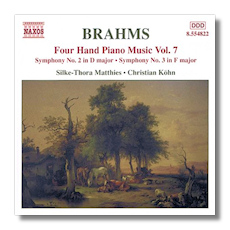
The Internet's Premier Classical Music Source
Related Links
- Brahms Reviews
- Latest Reviews
- More Reviews
-
By Composer
-
Collections
DVD & Blu-ray
Books
Concert Reviews
Articles/Interviews
Software
Audio
Search Amazon
Recommended Links
Site News
 CD Review
CD Review
Johannes Brahms

Four-Hand Piano Music, Volume 7
- Symphony #2 in D, Op. 73
- Symphony #3 in F, Op. 90
Silke-Thora Matthies & Christian Köhn, piano four-hands
Naxos 8.554822 78:35
Summary for the Busy Executive: The familiar, through a new lens.
We tend to forget what people had to go through to hear music, before the invention of the wax cylinder. You had two choices: pretty much at the mercy of the performers, you went to a concert, or you made the music yourself. With other causes, like the rise of the middle class and the lowering of instrument prices due to industrial mass production techniques, this led to an increase in the number of decent home pianists. Composers and music publishers capitalized on this situation quickly. For the publisher, piano arrangements of orchestral scores could provide extra cash, sheet music becoming the rough equivalent of a CD: cheap to produce and potentially selling thousands of copies.
Brahms, a fairly astute businessman, understood this very well indeed. He arranged all his major orchestral works either for piano four-hands or normal piano, as well as contributing original work to the genre. Furthermore, he published these arrangements in advance of the orchestral premières. By the time of the first full performance, some members of the audience, at least, had a deep familiarity with the score that comes with working through the arrangement for days on end. The age of the download has given us unprecedented access to music of all eras, but it has done so, I believe, at a price. We listen less well and with less understanding. We've by and large lost the "body-knowledge" of music where, through practice, it seeps into our muscles and our breathing. I suspect that not only do most of us not play the piano well enough to get through these scores, but that we probably don't know two pianists who can, and if we did, we haven't got a piano in the house. But we probably do possess at least two recordings each of these symphonies. Edison, in my opinion, has much to answer for.
Given that many of us have heard these symphonies many times in many different performances, does it make sense to have these? Even though I've heard better interpretations and can imagine better readings by different duos, I'd answer yes, if only because you get a radically different view of these things without their orchestral dress. It's like looking at an X-ray. It presents you with something close to pure musical thought. Where too many of us listen to Brahms' orchestra as melody-cum-accompaniment, the piano forces our attention on the extent of the genuine counterpoint in that accompaniment. After Brahms had received a solid technical grounding in composition and with a couple of major works to his credit, he put himself through a year's intense self-study of contrapuntal techniques. Afterwards, he could do astonishing things pretty close to Bach's level. However, also like Bach, he knew when and how to relax. This is especially true of the introduction to the Second, as well as that symphony's rondo-variations interlude. Incidentally, Matthies and Köhn do much better in the Second than in the Third (just like practically everybody else). So although the Third may be my favorite Brahms symphony – the most characteristic of the composer, the least haunted by Beethoven, and the most concentrated of the four – I must admit that, given what they accomplished on the Second, they disappointed me a bit on the Third. I can put my dissatisfaction in this way: they seem to understand the Second, to have it in their musical grasp, whereas they give the impression of simply reading the Third. The rhythmic ambiguity of the first movement, an homage to Schumann's "Rhenish," often doesn't come through. The movement exploits the doubt of triple-time: two groups of three vs. three groups of two. It's a device as old as the Renaissance, and Brahms revives it in a big way in a good deal of his music. Too often, however, Matthies and Köhn settle for a pure waltz.
Nevertheless, you owe it to yourself to hear this music with its face scrubbed. I, for example, heard stuff in the Third new to me, particularly the extent of the opening descending phrase throughout the entire work. Matthies and Köhn don't do terribly and after all deliver a pretty good Second, one that won't betray your memories of, say, Monteux. Also, it's on Naxos, so you can afford to gamble.
Copyright © 2008, Steve Schwartz




















